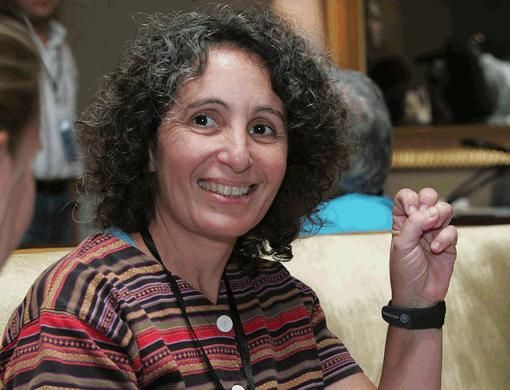Arab women in cinema are strong, confident and creative with a passion for film as apparent as in any of their male equivalents. And you can quite literally feel it from the moment they enter the room.
Although obviously warm and kind from the outset, Nadia Kamel has this almost intimidating air about her.
With a dream of directing her own films since the tender age of 12, Nadia knew what she wanted and set about making it happen.
The Egyptian's latest offering, Salata Baladi, is a strong contender in the official competition: documentary category.
A lengthy 105-minutes long, the documentary is a multilingual, multiethnic film about director Kamel's complex family background.
Nadia worked as an assistant director for over 10 years before her debut feature documentary Salata Baladi. Born in 1961 to journalist parents with a long history of political activism, Kamel grew up in a home steeped in progressive politics and a passion for the arts and popular culture.
Challenge
She said: "The biggest challenge as an Arab director is to find the courage to do what you want to do and follow the issues you want to highlight. As a woman, however, I often feel I have a head start because of that all-important element - emotion. I have a wonderful family who support me and have taught me a lot about myself and my life. They have a political background and this has also helped me view the world from different perspectives. But as women we access emotion better than most which, when it come to film, is always a plus."
A fresh perspective
Salata Baladi is set in 21st century Egypt which, spurred by the rallying cries of a global clash of civilisations, risks drowning in a nationalistic frenzy. Mary Kamel, Nadia's mother, was born in Cairo to a Jewish father and an Italian Catholic mother, and converted to Islam when she married her Egyptian husband Sa'ad. Mary and Nadia join forces to give Mary's grandson, Nabeel, a glimpse into possible alternatives: the family's century-old history of mixed marriages. But as Mary weaves her way through the family tales, she bumps into her own fears and the continued silence shrouding one branch of the family grows distressingly louder. Inspired by the fresh perspectives of her 10-year-old grandson, the family breaks arguably one of the most vicious taboos in modern Egypt.
A love odyssey
Milky Way is a confused love story, dedicated to Lina's mother who passed away, set in the social and urban context of a large metropolis. Heitor (Marco Ricca) and Julia (Alice Braga) are deeply in love and have dated for three years. After a heated phone conversation, Julia, an actress-turned-veterinarian, decides to break it off. As the conversation takes a turn for the worse, Heitor accuses the much younger Julia of favouring Thiago (Fernando Alves Pinto), an attractive actor her own age.
In the Milky Way, Chamie's choice of music supports the aesthetic in a unique fashion, taking us on an odyssey through the inner recesses of Heitor's mind.
Sweet comedy
Caramel, by Lebanese director Nadine Labaki is another offering by Arab women directors to catch today at 7.30pm at the Emirates Palace Main Theatre (EP1). A red carpet opening will precede the screening from 6pm onwards.
Caramel is a warm-hearted comedy that tells the story of Lebanese women from different generations and religious backgrounds whose lives intersect in a Beirut beauty salon. The characters, representing a cross-section of contemporary Lebanese society, bustle around the lively salon where they use caramel to wax their legs, emphasising a common bond beyond beauty treatments.
Lina Chamie has lived in Brazil for many years but was raised in Lebanon and still thinks of her roots in the Arab world.
The director of The Milky Way - an 88-minute film entered in the official competition: fiction section - says coming back to the region has stirred an awful lot of emotion within her.
Magical
She said: "I believe film is the most magical way to tell a story and does it better than many books. It is a way of manipulating time and bringing people into a screen to consider feelings, emotions and much, much more.
"I grew up on the streets of Beirut and returning to the region has stirred memories in me that I didn't even know I had."
Chamie is a graduate from New York University and as a student, she worked at the university's film department for more than 10 years and has directed many videos, including the prize-winning short film I Know That You Know (1995). The Milky Way is her second feature film and was shown at the Cannes Film Festival earlier this year.
Fore more information on all screenings visit www.meiff.com
A fresh perspective
Salata Baladi is set in 21st century Egypt which, spurred by the rallying cries of a global clash of civilisations, risks drowning in a nationalistic frenzy. Mary Kamel, Nadia's mother, was born in Cairo to a Jewish father and an Italian Catholic mother, and converted to Islam when she married her Egyptian husband Sa'ad. Mary and Nadia join forces to give Mary's grandson, Nabeel, a glimpse into possible alternatives: the family's century-old history of mixed marriages.
But as Mary weaves her way through the family tales, she bumps into her own fears and the continued silence shrouding one branch of the family grows distressingly louder. Inspired by the fresh perspectives of her 10-year-old grandson, the family breaks arguably one of the most vicious taboos in modern Egypt.












